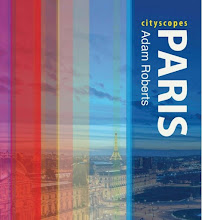 One of my favourite blogs is Lost City, run by the playfully named Brooks of Sheffield who chronicles the parts of New York that are slowly disappearing off the map because of "the ruthless real estate market and the City Fathers' disregard for Gotham's historical and cultural fabric", as he puts it.
One of my favourite blogs is Lost City, run by the playfully named Brooks of Sheffield who chronicles the parts of New York that are slowly disappearing off the map because of "the ruthless real estate market and the City Fathers' disregard for Gotham's historical and cultural fabric", as he puts it.The blog reeks of New York, and reads as if it is being spoken to you - by some gruff guy on a barstool who can't believe how far downhill his city is slipping. Posts alternately pan new builds that are 'ugly', and 'occupied by young couples who fight a lot', or mourn the passing of non-descript pizza joints. It is the journal of one man's struggle to preserve the traces that give his city its soul, and his raging against the implantation of chainstore logos and anywheresville aesthetics.
 We have a tendancy to believe that time moves more slowly in Paris, and that the streets are covered with some kind of protective dust sprinkled by the museum-minded city fathers. However, when you attempt to count how many Starbucks are now installed in the city, and remember that McDonalds is more popular in France than anywhere else outside of the US, you realise how wrong this idea is.
We have a tendancy to believe that time moves more slowly in Paris, and that the streets are covered with some kind of protective dust sprinkled by the museum-minded city fathers. However, when you attempt to count how many Starbucks are now installed in the city, and remember that McDonalds is more popular in France than anywhere else outside of the US, you realise how wrong this idea is.Sure, the city is still home to a huge number of independant traders, but on a regular basis one of these survivors will slowly come to the end of its life. Its death is not necessarily a sad event, but - like on Lost City - it seems important to capture it before it disappears for ever.
 L'Optique Michaud on the Avenue de Wagram is one of these places. Cameras and related equipment have been sold here for more than three generations, but its chunky vintage sign will soon be removed, probably to be replaced by the luminous blandness of a bank. Although times are tough in a market which has switched to digital and moved largely online, Philippe Michaud lived well enough from his business, and has now taken the opportunity to retire.
L'Optique Michaud on the Avenue de Wagram is one of these places. Cameras and related equipment have been sold here for more than three generations, but its chunky vintage sign will soon be removed, probably to be replaced by the luminous blandness of a bank. Although times are tough in a market which has switched to digital and moved largely online, Philippe Michaud lived well enough from his business, and has now taken the opportunity to retire.Nobody else would be able to take over the unit and install a similar business today in what is one of the most exclusive parts of the city. The public has moved on, and the city's face will reflect this.
 The disappearance of the teinturerie on nearby Avenue Niel is more difficult to understand. Dry cleaning services are abundant in Paris, but also seemingly copper-bottomed even in times of financial hardship. Once the equipment has been purchased, it is a business that needs little in the way of fresh investment, and can survive with limited staff numbers.
The disappearance of the teinturerie on nearby Avenue Niel is more difficult to understand. Dry cleaning services are abundant in Paris, but also seemingly copper-bottomed even in times of financial hardship. Once the equipment has been purchased, it is a business that needs little in the way of fresh investment, and can survive with limited staff numbers.The wonderfully preserved sign and polychrome frontage here seems to point to a unit that had not changed hands in a number of years, suggesting another retirement. Other owners may be found to keep the dry cleaning tradition going at this spot, but will they want to keep the vintage sign, or will they be looking to make their own fresh mark on the city?
In a few months time, I'll publish a follow up to this post, telling you exactly who has moved into these two units. I don't know what I'll find, but we will know what has been lost.




3 comments:
Great piece today! I have been documenting signs and buildings in Portland, Oregon for some time now. Many times I have found the structure has been demolished before I was able to capture it with my camera!! I now try to pull over immediately and take photos instead of waiting for the right light or time!
Thanks so much for such a great blog!
Cecily
Like so many of your posts a mixture of beauty, pride and sadness. I'm not sure that I want to read about the sucessors to these enterprises, given that they will almost certainly be 'identikit' multi-nationals.
Still on the positive side it makes one appreciate these little gems of social history even more - and who knows at some time in the future someone will post something bemoaning the passing of the McDonald's Golden Arches!
Cool Info
Post a Comment